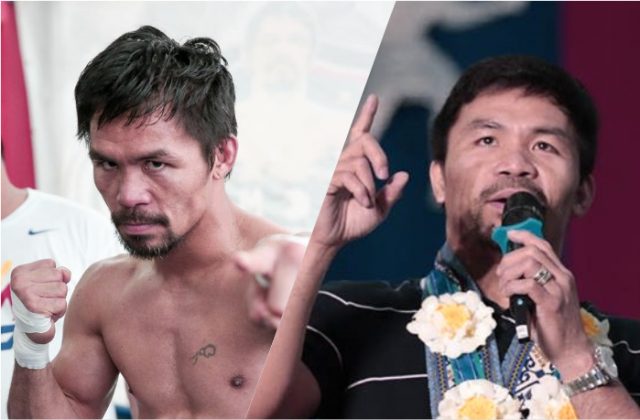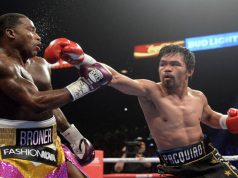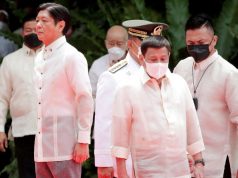The boxing match is over, but another battle is being fought in the social media arena.
Various public figures and members of the political punditry alike are embroiled in a debate over newly-crowned WBA Welterweight champion Manny Pacquiao, who also happens to be a member of the Philippine Senate, albeit one criticized for a number of controversial statements in the past.
The premise is simple: can Manny Pacquiao the boxer be separated from Manny Pacquiao the senator?
Boxer and politician, or vice-versa?
Pacquiao’s seventh round technical knock-out victory over Argentine fighter Lucas Matthysse saw the national spotlight shift to the athletic career of the Philippines’ boxer-turned lawmaker.
As expected, several public figures voiced out their praise for Sen. Pacquiao the boxer, but chose emphasize the dichotomy between his career in the ring and his career in public service.
Among those who chose to qualify their praise for Pacquiao is former solicitor general Florin Hilbay, who gave praise to Pacquiao’s abilities as a boxer but recognized his supposed lapses as a public official.
If you watch boxing, you have to recognize that Manny is a great boxer. Period.
His horrible views as a human being, despicable record as a politician, misuse of his popularity have no bearing on his ability to punch. Period.
Our hatred needs to survive the test of logic.
— florin hilbay (@fthilbay) July 15, 2018
Lawyer Gideon Peña’s praise for Pacquiao had a similar tone.
I will always be a fan of Manny Pacquiao, the Boxer; but never of Manny the politician.
Separate the yolk from the albumin.
— Gideon V. Peña (@gideonpena) July 15, 2018
The message did not sit well with some of their perceived allies.
Former deputy presidential spokesperson Abigail Valte, like Hilbay known as one of the previous administration’s greatest proponents, countered her former Aquino administration colleague’s qualified praise for the boxing senator.
Uhm, no. Just no. This is like saying we should separate Harvey Weinstein and his production contributions from his dastardly conduct towards women. Insisting on separation breeds tolerance because their achievements somehow “save” them. They shouldn’t. https://t.co/kjQyUNYstC
— Abi Valte (@Abi_Valte) July 15, 2018
For Valte and Pacquiao’s other detractors, praise for Pacquiao—criticized for a number of utterances made since the start of his career in public office—amounted to tolerating his controversial remarks against homosexuality.
Wow, kaya mo? Kase I can’t. He’s the same person. I was a fan since he started and once he showed what a bigot he truly is, no more. I can only be a fan of someone with amazing skills, good values, and upright principles. https://t.co/kdV7RTcIZM
— Ethel (@econcepcion) July 15, 2018
Pacquiao as politician
Pacquiao first tried his hand at politics when he ran as representative of the first district of South Cotabato in 2007 under the Liberal Party. However, he lost to Darlene Antonino-Custodio by around 65,000 votes.
He finally succeeded in 2010, when he beat Roy Chiongban’s bid for a congressional seat in Saranggani province, the home province of his wife, Jinkee.
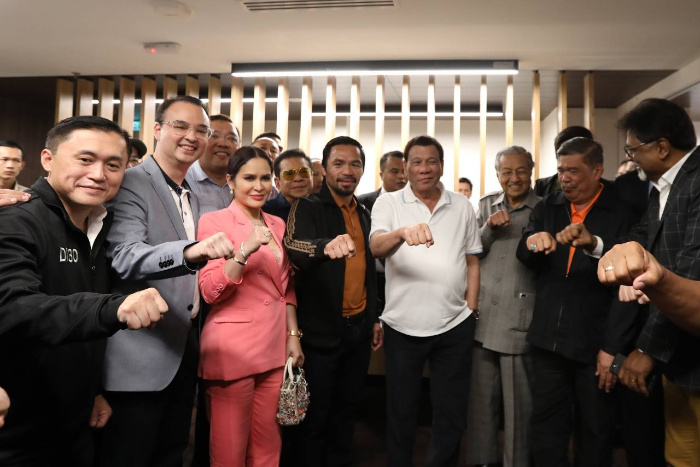
He ran unopposed for another term as representative of Saranggani in the 2013 elections.
His budding career in politics also propelled his wife Jinkee to a seat as vice governor of Saranggani in the same election.
In 2016, Pacquiao announced his desire to move up to the upper chamber of congress. Shortly before the start of his campaign for a seat in the Senate, his reputation among sports brands took a blow when he compared gay people to animals in a TV appearance.
Even before the statement, Pacquiao had been known for hardline views on religion.
The controversy led to sporting apparel brand Nike to terminate its endorsement contract with the aspiring senator and champion boxer.
Despite international criticism and backlash from LGBT members and advocates in the Philippines, Pacquiao was elected to the Senate that year, earning more than 16 million votes to finish seventh place in the senatorial race.
Since the start of his Senate career, Pacquiao was also criticized for supporting the re-imposition of the death penalty, citing the bible as authority and opposition to the Sexual Orientation and Gender Identity and Expression bill.
Pacquiao as ‘People’s Champ’
Pacquiao has frequently figured in the discussion on who the greatest pound-for-pound boxer to ever fight was. He still holds the record for being the only fighter to be world champion in eight different divisions.
With an impressive 60-7-2 record and another championship belt at 39 years of age, he has returned to the discussion despite a number of losses in recent years.
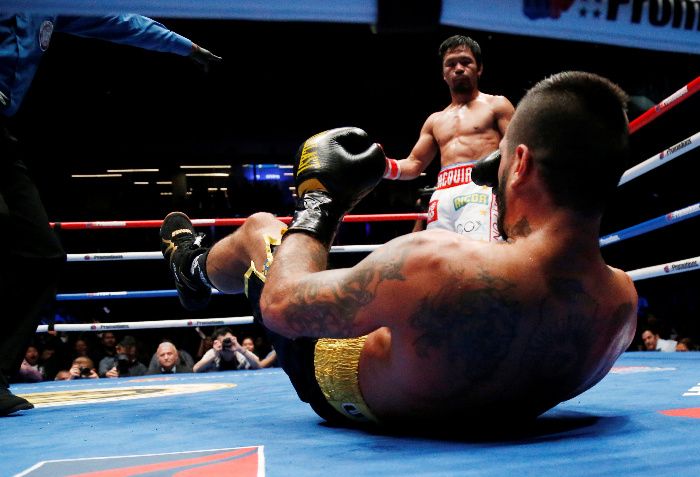
He was named the “Boxer of the Decade” of the 2000s and was frequently named “Fighter of the Year” at the height of his career.
Shortly before Pacquiao’s highly-touted 2015 bout with Floyd Mayweather, considered the biggest contemporary threat to Pacquiao’s legacy, sportswriter Rafe Bartholomew observed the extent of the effect Pacquiao had on Filipinos.
Bartholomew observed how Pacquiao had helped elevate Filipinos internationally, similar to how Pacquiao himself rose from obscurity and poverty into an international sporting legend with numerous business interests and most recently, a budding political career.
Supporting the ‘problematic’
The debate on whether “Pacquiao the Politician” can be separated from “Pacquiao the Athlete” is analogous to how some have asked whether artists and celebrities criticized for certain actions deserved to be recognized for their art.
In the United States, where many once-celebrated artists are now criticized after allegations of misconduct, fans have begun to ask if the work of such people still deserved recognition.
An essay by writer and critic Claire Dederer published by The Paris Review in September 2017 titled “What Do We Do with the Art of Monstrous Men?” reveals how Dederer, despite knowing the severity of the acts imputed to revered filmmaker Woody, continued to patronize the controversial auteur’s art.
Dederer in her essay recognized the part male privilege played in why suck works continued to be elevated, and offered no sympathy or justification for the director’s acts, but focused on the artwork by itself and argued that it was still valid for telling an important message, notwithstanding its creator’s wrongdoing.
In a follow-up interview with National Public Radio, Dederer discusses why she still thought Allen’s works were important, arguing for the importance of art that conveyed “dark emotions.”
Allen, the filmmaker behind such classics as “Annie Hall” and “Manhattan,” has been under fire for most of the latter part of his career for having been in an affair with Soon-Yi Previn, the adopted daughter of former girlfriend Mia Farrow.
Other art writers, such as Shannon Lee of Arstpace have argued against “separating” the art from the artist, claiming that such a practice ignored the victims of institutional power.
“It’s too convenient for established men who have made their careers off of images of women to have their misogynist abuses brushed aside with that simple, near canonized argument,” wrote Lee in an essay published in November 2017.
For some, sports may be a different arena altogether from the discussion on the separation of art and artist.
Art exists apart from the artist.
Scientific discovery exists beyond the scientist.
Punch good doesn’t.
— Nik (@iwriteasiwrite) July 15, 2018

